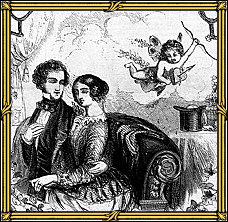CRI实用英语课堂 Unit 27 Happy Valentine's Day I 浪漫情人节(上)
搜索关注在线英语听力室公众号:tingroom,领取免费英语资料大礼包。
(单词翻译)
 Part 1 The History of Valentine's Day 西方情人节的来历
Part 1 The History of Valentine's Day 西方情人节的来历
Every February, across the country, candy, flowers, and gifts are exchanged between loved ones, all in the name of St. Valentine. But who is this mysterious saint and why do we celebrate this holiday? The history of Valentine's Day -- and its patron saint -- is shrouded1 in mystery.
But we do know that February has long been a month of romance. St. Valentine's Day, as we know it today, contains vestiges2 of both Christian3 and ancient Roman tradition. So, who was Saint Valentine and how did he become associated with this ancient rite4? Today, the Catholic Church recognizes at least three different saints named Valentine or Valentinus, all of whom were martyred.
February 14 is Valentine's Day. It is celebrated5 as a lovers' holiday today, with the giving of candy, flowers, or other gifts between couples in love. Valentine's Day has roots in several different legends that have found their way to us through the ages.
In Rome it's said that it originated in 5th Century as a tribute to St. Valentine, a Catholic bishop6.
For eight hundred years prior to the establishment of Valentine's Day, the Romans had practiced a pagan celebration in mid-February commemorating7 young men's rite of passage to the god Lupercus. The celebration featured a lottery8 in which young men would draw the names of teenage girls from a box. The girl assigned to each young man in that manner would be his female companion during the remaining year.
In an effort to do away with the pagan festival, Pope Gelasius ordered a slight change in the lottery. Instead of the names of young women, the box would contain the names of saints. Both men and women were allowed to draw from the box, and the game was to emulate9 the ways of the saint they drew during the rest of the year. Needless to say, many of the young Roman men were not too pleased with the rule Changes.
Instead of the pagan god Lupercus, the Church looked for a suitable patron saint of love to take his place. They found an appropriate choice in Valentine, who, in AD270 had been beheaded 3 by Emperor Claudius. Claudius had determined10 that married men made poor soldiers. So he banned marriage from his empire. But Valentine would secretly marry young men that came to him.
When Claudius found out about Valentine, he first tried to convert him to paganism. But Valentine reversed the strategy, trying instead to convert Claudius. When he failed, he was stoned and beheaded.
During the days that Valentine was imprisoned11, he fell in love with the blind daughter of his jailer. His love for her, and his great faith, managed to miraculously12 heal her from her blindness before his death. Before he was taken to his death, he signed a farewell message to her, "From your Valentine." The phrase has been used on his day ever since.
Although the lottery for women had been banned by the church, the mid-February holiday in commemoration of St. Valentine was stilled used by Roman men to seek the affection of women .It became a tradition for the men to give the ones they admired handwritten messages of affection, containing Valentine's name. 
Another Valentine was an Italian bishop who lived at about the same time, AD 200.He was imprisoned because he secretly married couples, contrary to the laws of the Roman emperor. Some legends say he was burned at the stake.
February 14 was also a Roman holiday, held in honor of a goddess. Young men andomly chose the name of a young girl to escort to the festivities. The custom of choosing a sweetheart on this date spread through Europe in the Middle Ages, and then to the early American colonies. Throughout the ages, people also believed that birds picked their mates on February 14!
In AD 496 Saint Pope Gelasius I named February 14 as "Valentine's Day". Although it's not an official holiday, most Americans observe this day. The first Valentine card grew out of this practice. The first true Valentine card was sent in 1415 by Charles, duke of Orleans, to his wife. He was imprisoned in the Tower of London at the time.
Cupid, another symbol of the holiday, became associated with it because he was the son of Venus, the Roman god of love and beauty. He is represented by the image of a young boy with bow and arrow. Cupid often appears on Valentine cards.
Whatever the odd mixture of origins, St. Valentine's Day is now a day for sweethearts. It is the day that you show your friend or loved one that you care. You can send candy to someone you think is special. Or you can send roses, the flower of love.
2月14日是“情人节”。如今它被人们作为情侣的节日来庆祝,相爱 的人之间互赠糖果、鲜花或其他礼物。关于“情人节”的来历,有许多不同的传说经历了漫长的岁月,一直流传至今。
的人之间互赠糖果、鲜花或其他礼物。关于“情人节”的来历,有许多不同的传说经历了漫长的岁月,一直流传至今。
在罗马,据说它源自于5世纪,是为了纪念一位天主教牧师Saint Valentine。在“情人节”确立前800年,罗马人就已经有了一项在2月中旬举行的异教徒庆典活动,年轻人通过庆典来纪念卢帕克斯神。这项庆典的特点是进行抽签,让年轻的男子从盒子里抽取十几岁少女的名字。通过这种方式分配给每一位年轻男子的女孩就成了他那一年的女伴。
为了废除这个异教的节日,罗马教皇盖拉西厄斯命令抽签活动必须稍作改动:盒子里面装的不再是年轻女孩的名字,而是圣徒的名字。男人和女人都可以从盒子里抽签,游戏的目的是让他们在本年度里仿效他们所抽到的圣徒的行为方式。不用说,很多罗马的年轻人并不喜欢这种规则的改变。
教会决定寻找一位更适合的爱的守护神来代替异教的卢帕克斯神。他们发现Valentine是一个非常恰当的人选,他于公元270年被克劳迪亚斯王斩首。 克劳迪亚斯王坚信已婚男人是无用的战士,因此在他的王国内禁止结婚。但是Valentine却秘密地帮助那些来找他的年轻人主持婚礼。
当克劳迪亚斯王发现瓦伦西的行为后,他先是试图使Valentine皈依异教,然而Valentine却将计就计,反过来要使克劳迪亚斯王改信基督教。他失败了,于是被乱石砸死并被砍了头。
Valentine在被囚禁的日子里,与监狱长那盲眼的女儿相爱了。在他死前,他对她的爱和极度的忠诚竟然奇迹般地治好了她的眼睛。在他被押赴刑场之前,他在给她的诀别信中,签下了“from your Valeninte”。从那以后这句话一直被沿用至今。
虽然抽签得女人的活动已经被教会禁止,但罗马的男人依旧利用二月中旬这个纪念Valentine的节日来追求女人的爱情。男人将他们手写的爱情字条签上Valentine的名字,然后送给他们所爱慕的女人,这逐渐演变成了一种传统。
另一位Valentine是一位意大利主教,生活在同一时代,大约公元200年。他被投进监狱是因为他秘密地帮别人主持婚礼,这违反了当时罗马帝国的法律。有一些传说说他是被绑在火刑柱上烧死的。
2月14日也是罗马人为表示对女神的敬意而庆祝的节日。年轻的男子随便挑选一个年轻女子的名字,该女子便赔他度过这个节庆。中世 纪时,在这个日子里选择意中人的习俗传遍了整个欧洲,然后又传到了早期的美洲殖民地。
纪时,在这个日子里选择意中人的习俗传遍了整个欧洲,然后又传到了早期的美洲殖民地。
千百年来,人们一直相信鸟儿在2月14日选择配偶。 在公元496年,圣徒罗马教皇盖拉西厄斯1世把2月14日命名为"Valentine's Day"(情人节)。虽然这不是一个官方节日,但大数美国人都很重视这一天。 第一张情人节卡片就是在这种情况下诞生的。1415年,奥尔良公爵查尔斯将第一张真正的情人节卡片送给了他的妻子。那时,他正被关在伦敦塔内。
丘比特是这个节日的另一个象征,之所以与这个节日有联系,是因为他是罗马爱情和美丽的女神维纳斯的儿子。他被描述成一个带着弓和箭的小男孩的形象。丘比特常常出现在情人节卡片上。
无论渊源有多么复杂,“情人节”如今已是情侣们的节日。这是你用来表达你对朋友和爱人的关心的日子。你可以把糖果送给对你来说很特别的人,也可以送爱情的花朵---玫瑰。
Part 2 Valentine Traditions and Customs 情人节传统习俗
St Valentine's Day is celebrated on February 14 of each year, the reason why it is celebrated on this day is because this was the day that the Patron Saint of Lovers "St Valentine " was supposedly executed on. On this day lovers all around the world mark this occasion as a day for sending poems, cards, flowers or candy, etc. They might also be a social gathering13 or ball to mark the occasion.
" was supposedly executed on. On this day lovers all around the world mark this occasion as a day for sending poems, cards, flowers or candy, etc. They might also be a social gathering13 or ball to mark the occasion.
Many Valentine's Day customs involved ways that single women could learn who their future husbands would be. Englishwomen of the 1700's wrote men's names on scraps14 of paper, rolled each in a little piece of clay, and dropped them all into water. The first paper that rose to the surface supposedly had the name of a woman's true love.
Also in the 1700's, unmarried women pinned five bay leaves to their pillows on the eve of Valentine's Day. They pinned one leaf to the center of the pillow and one to each corner. If the charm worked, they saw their future husbands in their dreams.
One of the oldest customs was the practice of writing women's names on slips of paper and drawing them from a jar. The woman whose name was drawn15 by a man became his valentine, and he paid special attention to her. Many men gave gifts to their valentines. In some areas, a young man gave his valentine a pair of gloves. Wealthy men gave fancy balls to honor their valentines.
Valentine cards became popular in Great Britain in the nineteenth century. Noted16 artist Kate Greenaway created cards which featured joyful17 children and beautiful gardens. Esther Howland was one of the first Valentine card manufacturers in the United States. Inspired by a British card, she began production in 1847. Her cards featured lace and paper flowers and leaves. Other card manufacturers emphasized
Cupid, the pudgy, winged son of Venus, the goddess of love. In Roman lore18, Cupid is known as Eros, the son of Aphrodite.
In the United States and Canada, children exchange valentines with their friends. In some schools, the children hold a classroom party and put all the valentines into a box they have decorated. At the end of the day, the teacher or one child distributes the cards. Many children make their own valentines from paper doilies, red paper, wallpaper samples, and pictures cut from magazines. Sometimes they buy kits19 that include everything needed to make valentines. Many children send their largest, fanciest cards to their parents and teachers.
In Europe, people celebrate Valentine's Day in many ways. British children sing special Valentine's Day songs and receive gifts of candy, fruit, or money. In some areas of England, people bake valentine buns with caraway seeds, plums, or raisins20. People in Italy hold a Valentine's Day feas t.
t.
Valentine's Day曾是英国人喜爱的节日,随着新大陆的开发,英国移民把这一富有浪漫色彩的节日带到了北美,逐渐在美国生根开花。
年轻人是圣Valentine节当之无愧的主角,他们要在这一节日里郑重其事地为恋人选择礼物、赠送鲜花,表达自己的爱慕之情。痴情的姑娘可能会按照古老的传说,在圣Valentine节前夜把月桂树叶放在枕头上,盼望在梦中同自己的心上人相会。
现在情人节已经不单是情人们的节日,也是各种朋友之间交换感谢的一个日子,是一个大众化的节日。情人节这一天,不仅仅情侣们互赠卡片和礼物,人们也给自己的父母、老以及其他受自己尊敬和爱戴的人赠礼物和卡片。Valentine's Day就是这样一个充满爱情和友谊的欢乐节日。
 收听单词发音
收听单词发音 




